08Ramanamaharishi20100725 சக்தி விகடன் - 25 Jul, 2010 2010-07-25-part1 Posted Date : 06:00 (25/07/2010) ஸ்ரீரமண வழி SriRamana’s Path |
| Author:
Balakumaran |
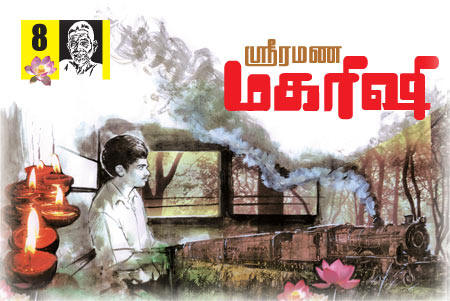
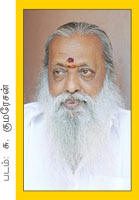
|
| ‘The letter begins, ‘I searching for
Father, on his orders…’ This is not an act of man. The
omnipresent Bhagavan shining everywhere makes these events
happen upon his orders. Why this move? The answer is, ‘In search
of Him…’ Leaving home: Is it a grievous act? Certainly not. It is a good deed. For every life, every Āṉmā (soul), it is a must-do act. To go in search of God and to leave home for that express purpose is the grandest of all acts. Therefore, there is no sorrow in this separation. There is no need to waste time, money, effort… on this. This idea is expressed in a subtle manner in this letter. This letter reveals beautifully and plainly, there is no return. Since he did not want to cause any grief to anyone else before his final goodbye, he wrote, ‘I did not pay the fees from your salary.’ Two rupees are herein left.’ That tells his behavior has been of help to others (here his brother). The letter ends with no parting signature. ‘Leaving one’s identity aside and standing alone’- so goes a song. Such a person has no name. No address. No friends. The letter started as ‘I’, points later to ‘This’ referring to himself, rises in a stepwise fashion to a high point, blossoms and shatters. (Ego encompassing I-Me-Mine paradigm loses its intrinsic nature, becomes ‘That’ referring to himself as inanimate object and lastly is sacrificed in the presence of God: A total annihilation of Ego, if one wants to face God.) ‘Aham’ undergoes self-destruction. After it shatters irretrievably, it leaves with compassion, with no inconvenience to all and with a parting message. That message is materialism (the nature of the world), one of six external religions. It (materialism) is not applicable to the writer of the note. Venkatraman paid his debt to his brother in an amicable manner. The Vedic scholars while performing Homam (Fire Sacrifice), commit the Dharba grass to the fire after wetting the tip, the middle and the base (of the grass). Many events and objects have this setup: The top, the middle and the beginning. It applies to all dimensions. We can see that growth (inclination of spirit and declination of matter) in this written note. ‘I’ is the top in the note; ‘This’ depicts the freedom without the I-Factor; the lastly the absence of his signature indicates the root or the causal state. It starts with ‘I’, then to the impersonal ‘That’, and lastly to absolute absence of all phenomenal objects. The mind ends in the nameless and the placeless. |
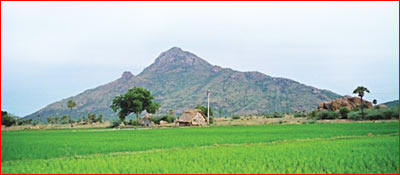 |
|
This letter easily shows the ‘Ramana path’ for the seekers and the spiritually inclined. This note explains, that the conceit of I-ness declines to the conceit of This-ness (an eviscerated state of I-ness), and eventually to the signature-free ending of the letter with total disappearance of I-factor and attainment of Mukti or liberation, which is the highest accomplishment (as shown in the letter). He made no reference to the Divine Command of Aṇṇāmalaiyār (the presiding deity in Tiruvannamalai). By saying, ‘Father’s Command’ he placed Aṇṇāmalaiyār in the highest place. ‘God is the basis of my existence. He implied the root of existence. What is happening is not according to my liking. Some possessive force keeps me in tow. The letter states with love and support that the near and dear should have no sorrow. On 29th August, 1896, as the near and dear were in siesta at about 12 noon, Venkatraman left the house for good. He was nervous but felt he must go to Tiruvaṇṇāmalai. It is possible he was afraid. The time for arrival of the train on the way to Tindivanam was 12 noon. He was late in leaving the house. He was anxious whether he would miss the train. The train came late. On the platform, he looked at the price chart. 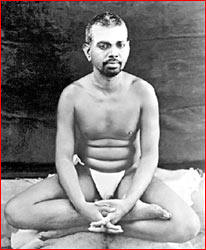 Tindivanam:
3 Rupees 13 Aṇās. He was excited and in a rush. He overlooked
the entry: Tiruvaṇṇāmalai 3 Rupees on the pricing chart. In his
anxiety and confusion, he missed seeing it. But, whatever
happens to good people will turn out good. Tindivanam:
3 Rupees 13 Aṇās. He was excited and in a rush. He overlooked
the entry: Tiruvaṇṇāmalai 3 Rupees on the pricing chart. In his
anxiety and confusion, he missed seeing it. But, whatever
happens to good people will turn out good. The train came to the station and he got into the train with only a loin cloth, a shirt on his back, two earrings, and a feeling of exhilaration. The train moved out of the station after a little while. He was excited to know he would see his Father, to whom he paid homage in his mind. He sat cross-legged and closed his eyes. He looked inside the white empty space for the appearance of the root cause of ‘I’ thought. On the way to Tindivanam, a thought of someone waiting to embrace him on his arrival occurred to him. He lost his earthly father, separated from his mother, released himself from the excessive and possessive love of his brother and ran away from the confining environment of his uncle and aunt. He played hard, always wanting to succeed, though he slept long and deep. He listened to the stories of gods. He remembered Nāyaṉmārs subjected to the trials and tribulations by God, their eventual success in overcoming them and the Darśan they received of the Father. He searched for God in the temples and corridors. He desired to see God jump down from the sky. He experienced exhilaration on hearing the name Aṇṇāmalai. For wanting to know what death is, he shut his eyes and pretended to have died. When he continued to practice the death-mode, internal changes took place and he met with a shocking change and new conscience flowered. From then on, he was subdued like the extinguished flame. He was devoid of anger, no matter who and what. He tried to move away from school studies as doubts rose about the utility and gain from formal education. He liked to close his eyes and do Dhyana. He liked solitariness. As he opened the books to read, something pulled from inside to induce shut eyes. He sat with closed eyes in the train. He was the foremost among men going to the highest of realms, having the desire to offer salvation to the accomplished, and show the Path of Ramana to those in worldly pursuits. He had change amounting to 3 Aṇās tied in the end corner of his dhoti. He was on a journey with certainty of a life of no worries, and shut-eye Dhyana. This is merely not a human effort. This is beyond human effort. A Sakti selects a few, draws him or her closer, makes him effulgent and helps remove the darkness of nescience in the world with the Light of Wisdom. ‘He merged with the Thillai-space. Will he ever come back.’ – in line with the song, Venkatraman forgot Madurai that he left behind. As the train chugged along, the breeze was a welcome relief. - தரிசிப்போம்... Let us Receive Darsan… சக்தி விகடன் - 25 Jul, 2010 2010-07-25-part2 தொடர்கள் Posted Date : 06:00 (25/07/2010) கருணை தெய்வம் காஞ்சி மகான் KanchiMahan the deity of Mercy  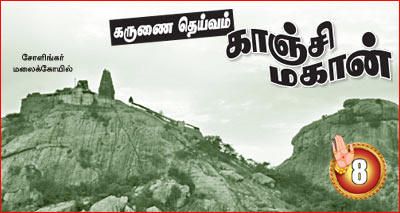  Fiddle
Sundara Sastrikal was an elderly gentleman, who conducted
Ādisankara Jayanti for many years. Mahāperiyava called me to
tell that Sastrikal was getting too old and ready to relinquish
the responsibility to a younger person and asked me to take the
responsibility. According to Periyava’s bid, for about 50 years
I conduct the Jayanti in the village of Kalavai. Periyava
participated in the celebrations many times. Pattu Sastri
narrated an event managed by him with no experience but with
Maha Periyava’s blessings. Fiddle
Sundara Sastrikal was an elderly gentleman, who conducted
Ādisankara Jayanti for many years. Mahāperiyava called me to
tell that Sastrikal was getting too old and ready to relinquish
the responsibility to a younger person and asked me to take the
responsibility. According to Periyava’s bid, for about 50 years
I conduct the Jayanti in the village of Kalavai. Periyava
participated in the celebrations many times. Pattu Sastri
narrated an event managed by him with no experience but with
Maha Periyava’s blessings.The event took place about 45 years ago. Mahāperiyava went on a pilgrimage on foot and stayed in Solingapuram. It is a big Narasimha Kṣētra. There was an Anjaneya Temple too. It is a famous place. Knowing that Mahāperiyava was in a camp, the former president R. Venkatraman, his wife Janaki and Andhra Pradesh I.G Ramanathan came to visit with Periyava. From Valajapettai, Kottachetty Dr. Venugopal and others came to receive Darśan of Mahāperiyava. SriKandan was a member of the Mutt. He went begging for alms and cooked for Mahāperiyava. He begged only for Periyava and that was his assigned duty. We don’t know what Periyava had on his mind. He sent for me and said, “Many people spent time and effort to come here and visit with me. We should not let them go hungry. Do what you can to feed them.” I was shocked to hear it from him. I stood there spellbound. I know no cooking. I am not a caterer. I could not tell him I knew no cooking and to look for someone else. I knew him since I was 10 years old. I was sure he would not put me in a position of embarrassment. I believed he would stand by me giving me support. I got pots and pans from the manager of the Chatram. I bought some provisions from a nearby shop. The campsite was in the foothills. Where am I to go for a roller and a grinding stone? I found a rock and use it for grinding condiments. I brought some stones and sticks and prepared a fire. I made rice, Rasam… Someone donated rice. Periyava showed me the rice and said, “look at this. This rice looks royal.” Narasimhar was on the top of one mountain. Anjaneyar was on a smaller mountain. Periyava, I and others climbed the mountains to receive Darśan of 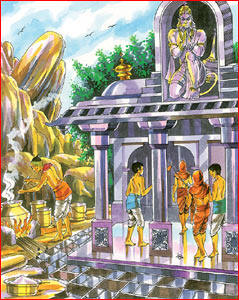 all deities.
all deities.  We took some time to climb down. It was midday in the foothills; the chow line already formed. Everyone was hungry. I sat them all and served them meals. The visitors were all VIPs, holding high position in the Government. I have not cooked before in my life. Would they like the meal I prepared? With trepidation, I served them what I cooked. They ate and were satisfied. What a relief and supreme tranquility. I did not tell Periyava I knew only Vaidik traditional Sastras and I was no cook or chef. I did not stand there idle with folded hands. ‘This is the call of Mahāperiyava. Though I know no cooking, my inviolable belief was he will cast his divine influence. His divine favor only saved me from catastrophe. All the visitors declared that the meals were tasty, filling and satisfying. Mahāperiyava called me. I was afraid and stood before him. Periyava said, “You did a good job.” Raising his hand, he blessed me saying, “You will be in good health.” Periyava, complimenting me, offered his blessings. Pattu Sastri said, “His blessings were enough for me. What else do I need.” - தரிசனம் தொடரும் – Darśan will continue |